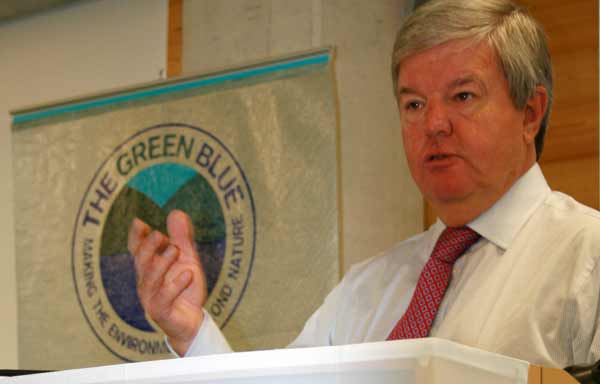BMF/RYA Green Blue annual conference
The environmental team at the Royal Yachting Association – the Green Blue – has succeeded in cutting the organisation’s head office energy consumption by 9.8% saving more than £10,000, according to Chief Executive, Rod Carr, OBE.
Speaking to delegates from across the marine industry at the Green Blue conference yesterday (4 November), the CEO, who retires after 25 years in March, admitted that getting people of his generation interested in environmental matters could be a challenge, but added: ‘Our finance people are extremely happy, so I’m happy.’
The changes at RYA House in Hamble, took place over a period of just 10 days, according to Green Blue Project Manager, Sarah Brown, and were all based around using less electricity. ‘The servers and air-conditioners were coming on an hour earlier and switching off an hour after anyone was coming into the office,’ she added. ‘We were over-cooling the server room itself 24 hours a day, seven days per week and running machines overnight that didn’t need to be on.’
‘This is not some tree-hugging, liberal ideal,’ agreed keynote speaker, Sir Keith Mills (pictured), deputy chair of the London Organising Committee for the Olympic Games (LOCOG) and Principal of Team Origin, the UK’s America’s Cup team entry.
Referring to the root and branch environmental policies of both the Olympic organisers and the America’s Cup campaign, he added: ‘This is an investment and we expect to see a return.’
‘We have a dual aim at Team Origin: to win the America’s Cup and help win the race against Climate Change. Sailing ‘fits’ with the message about respecting the environment. It’s a naturally green sport.’
Sir Keith has teamed up with the Carbon Trust (CT), a Government green energy investment organisation funded by a levy on the electricity companies. Team Origin will promote the Trust and take advice on how to reduce energy and waste within the campaign. Further Team Origin corporate sponsors will then also benefit from association with the CT as well as its expertise.
‘At LOCOG we have signed over 75,000 individual commercial contracts to service and build the UK’s largest peacetime event. And every single one requires the organisation’s environmental policy is adhered to. And so on down the chain. The policy is extensive and is printed on our website.’ He added that with 30,000 journalists expected to attend the 2012 Olympics, there would be few places to hide any environmental mistakes.
Conference delegates included Paul Strzelecki, Joint CEO of Henri Lloyd, John Eads, MD of Marina Developments Ltd, and Rupert Wagstaff, deputy MD of Yacht Havens Group.
Speakers included John Tweed, CEO of Weymouth and Portland National Sailing Academy, Rob Stevens, CEO of the British Marine Federation, and environmental experts from three of the UK’s leading energy management consultation organisations: Carbon Descent, Sustain and Envirowise.
But the best was saved for last as Mark Ormiston, MD of Ormiston Wire – the sixth generation of his family to run the London-based specialist metal fabrication and wire rigging company – delighted the attendees with his simple, but effective use of abundant Government environmental grants to shave tens of thousands of pounds off his utility bills, saving jobs for nearly 20 years and cutting costs along the way.
‘First we tried stickers next to the light switches to get people to switch them off when they left a room. That didn’t work, so we got a Government grant to install motion sensors, which cut our electricity bill an enormous amount. We started using the incoming supply boxes to ship our own products back out. We bought a second-hand rubbish compactor as well, which has reduced the number of skips hired every year for waste from one a week, to two a year. We installed super-efficient space heaters, plus fans in the ceiling of the workshop to blow the hot air back down to the floor where it’s needed. We cut out all weekend power and energy use and within four years I was saving the company £25k a year – enough to pay an employee’s salary for the year.’
Mark insists his suppliers must also work towards the ISO eco-standard that Ormiston has now acheived and in 2002, Ormiston was awarded the Queens Award for sustainable development. The 120 solar panels on his workshop roof generated £750 worth of excess electricity to sell back to the National Grid and with the Feed In Tarrif rate set to go live in April 2010, he plans to install a stand-alone wind generator as well.
John Tweed of Weymouth and Portland National Sailing Academy already makes 15% of the centre’s energy by solar panels and is in talks with underwater turbine manufacturers about installations off Portland Bill taking advantage of the notorious tidal race.
Angie Martelli, Area Manager of South-West Lakes Trust is planning to institute subsidised campsites at several of the Devon and Cornwall water activities centres that make use of large numbers of casual staff in the summers. ‘Currently most of them drive to and from work, some quite large distances. If we can offer them a cheaper option to camp on site it will reduce emissions.’ They are also looking into re-using rainwater for flushing toilets and building composting toilets.




